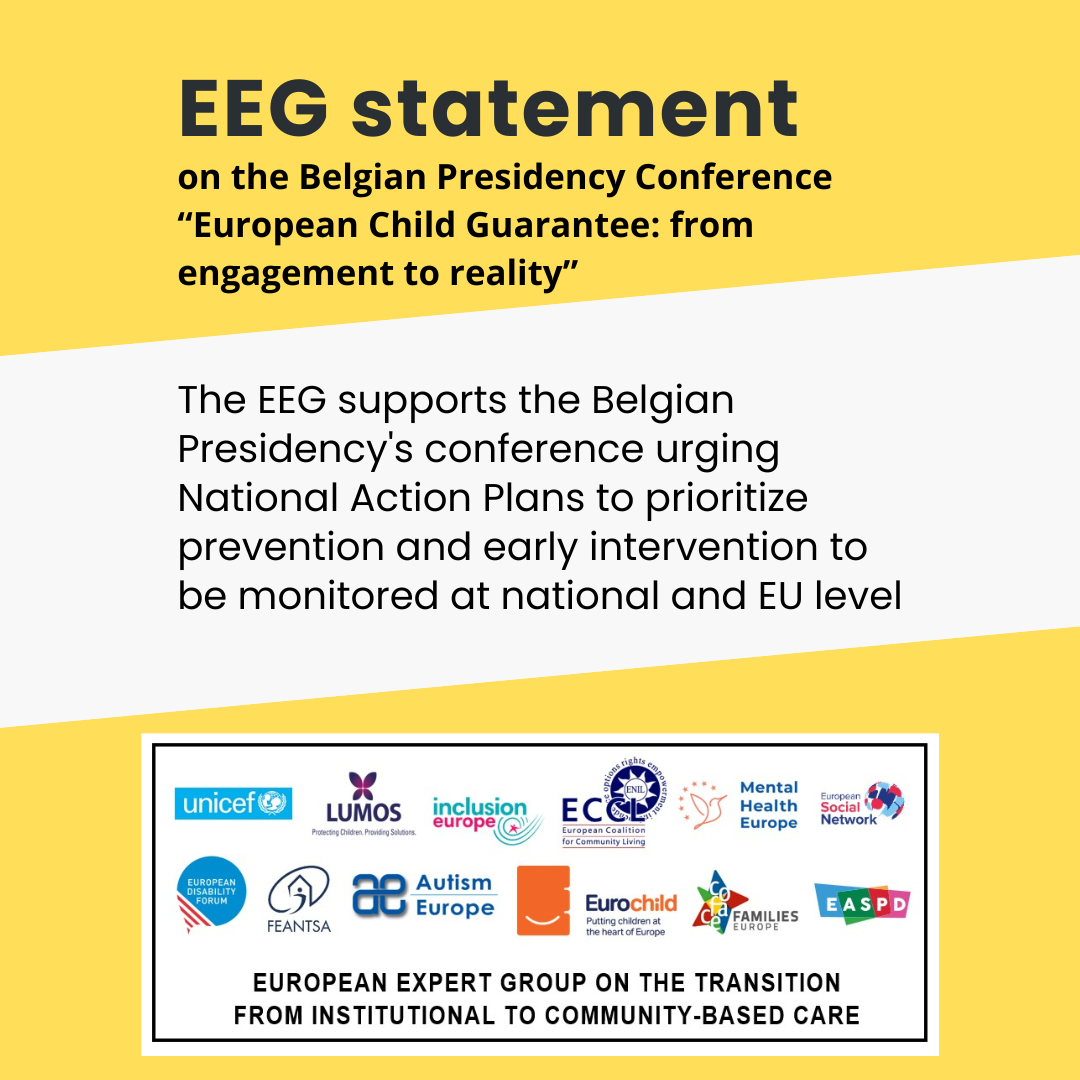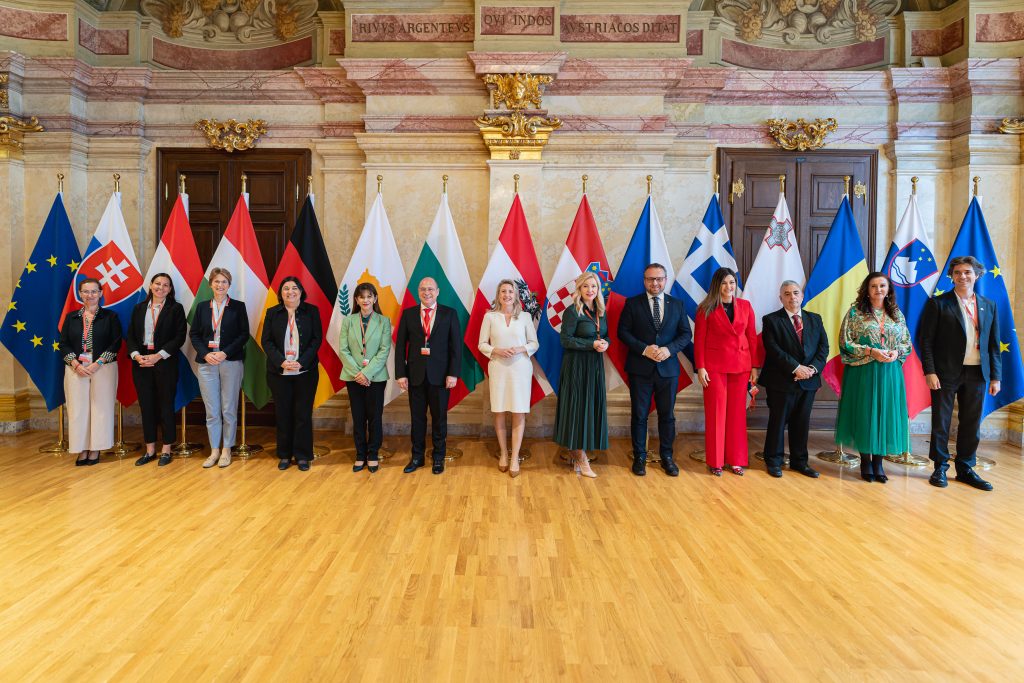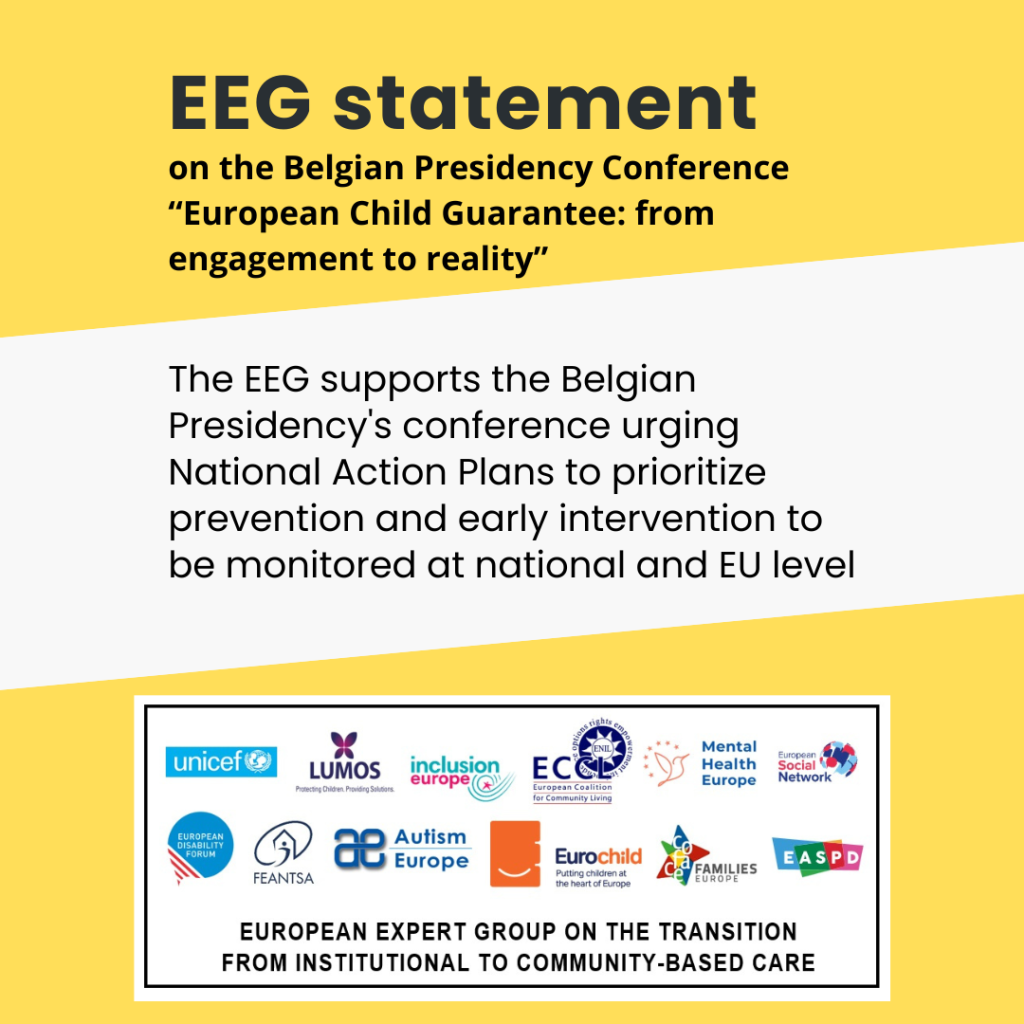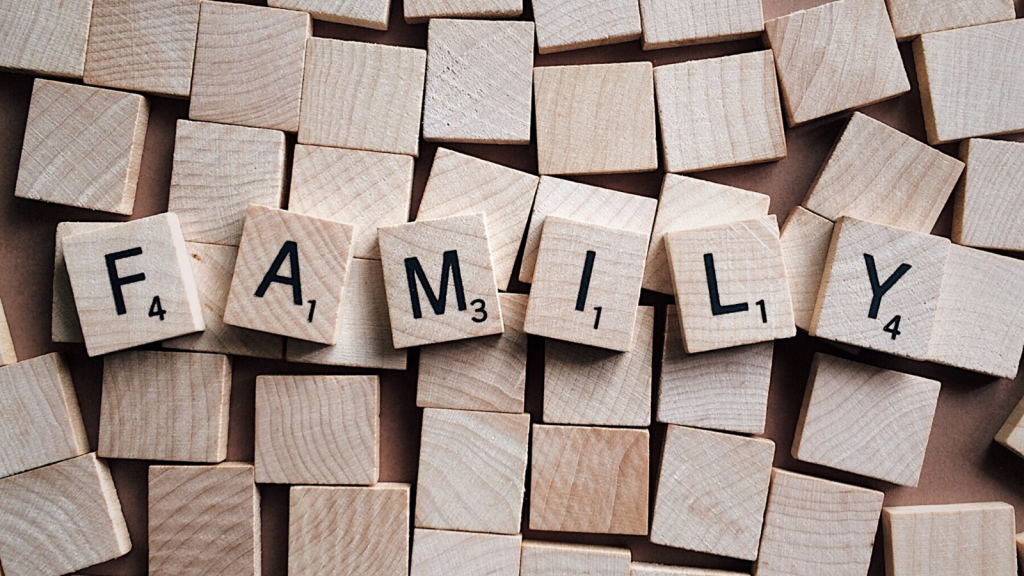Joint statement of the EEG-DI. Brussels, 2 May 2024
Call for stronger prevention of child institutionalisation:
Time to step up monitoring and evaluation of early childhood intervention and family support in the European Child Guarantee
The European Expert Group on the transition from institutional to community-based care (EEG) welcomes the initiative of the Belgian Presidency of the Council of the European Union to host the knowledge-sharing Conference “European Child Guarantee: from engagement to reality” on 2 and 3 May 2024. The EEG welcomes that many National Action Plans (NAPs) include measures in the area of deinstitutionalisation (DI) for children but calls for increased emphasis on prevention and early intervention, including Early Childhood Intervention (ECI) and support to parents and carers, to be monitored at national and EU level and addressed in the updated versions of NAPs.
_____________
Enacted in June 2021, the European Child Guarantee represents a crucial step towards combating social exclusion by facilitating access to essential services and has catalysed momentum for the deinstitutionalisation of children. It identified children with disabilities and children living in alternative care among its target groups and invited Member States to enhance social protection, prevent children from being placed in institutional care, and ensure their transition to quality community-based and family-based care. Importantly, it also encouraged them to facilitate the early identification of developmental issues and health needs, and to provide habilitation and rehabilitation services for children with disabilities.
Overall, the Child Guarantee tackles many drivers of child institutionalisation, including poverty and lack of access to services, especially for children with disabilities. This is in line with the commitment of the EU to ensure the transition from institutional to family and community based care in its most important policies[1] and funding regulations.[2] These also include the 2024 Commission Recommendation on developing and strengthening integrated child protection systems in the best interests of the child,[3] encouraging investment in non-residential services, including accessible housing for children with disabilities, and calling for the promotion of national deinstitutionalisation strategies for deinstitutionalisation, ensuring adequate support for foster families and comprehensive support programmes for young people with care experience.
Importantly, as a party to the UN Convention on the Rights of Persons with Disabilities, the European Union is required to ensure full enjoyment of all rights by children with disabilities “on an equal basis with other children.” This includes deinstitutionalisation, including the requirement not to invest any public or private funding into institutions for children.
This role of the Child Guarantee in implementing deinstitutionalisation has also been reiterated in The European Parliament’s Resolution Children first – strengthening the Child Guarantee, two years on from its adoption (2023/2811(RPS)) stressing the need for ‘’Time-bound targets for bringing children out of institutions and into family and community settings’’. Further, it adheres to the European Parliament’s Report ‘’Reducing inequalities and promoting social inclusion in times of crisis for children and their families’ (2023/2066(INI)), highlighting that “child protection measures, including deinstitutionalisation, are also essential for children to achieve their rights and reach their full potential’’, and recommending that ‘’Member States develop proactive social policies to tackle the root causes of child institutionalisation, ensuring that it is not because of poverty and exclusion that children are institutionalised’’.
Nevertheless, almost three years after its adoption, across Europe hundreds of thousands of children still live in institutions, isolated from their families, their peers and local communities. An institution is any residential care facility where residents are isolated from the broader community, do not have enough control over their lives or decisions affecting them, and which is characterised by features such as depersonalisation, lack of individualised support, or limited contact with birth families or caregivers. “Family-like” institutions, including large or small group homes, also fall within the definition of an institution and should not be considered as a substitute for a child’s right to grow up with a family.[4]
Growing up in an institution can severely damage children’s cognitive, social, and emotional development as well as autonomy. Children do not learn basic life skills or how to manage their own lives while they are kept in institutions, and are thus unprepared for life in the outside world.[5] Child institutionalisation has devastating consequences not only on the affected children and their families, but on society as a whole, by exacerbating stigma and social isolation, and feeding the intergenerational cycle of disadvantage.
Deinstitutionalisation requires a structural transformation of the social-care and child-protection systems. This includes preventative measures addressing children and families, to avoid children being placed in institutions in the first place, through access to mainstream services, healthcare, education, and welfare systems, as well as parents’ financial support, and programmes to foster kinship and foster care.[6] It further requires that children, including children with disabilities, are involved in decisions made about them and that their opinions are given due weight in accordance with their age and maturity.[7]
The EEG welcomes that several countries included measures to support children in alternative care and/or advance reforms linked to deinstitutionalisation in their National Action Plans (NAPs).[8] However, we noticed that in some cases, these measures are limited and not part of a comprehensive framework, are not accompanied by the right type of support for local authorities to put them in place, and their implementation can be rather slow.[9]
Prevention and early intervention should lead the development of alternative care programmes for all children, which should always be implemented with the best interest of the child as their guiding principle. For children with disabilities, overrepresented in institutions, family-centred Early Childhood Intervention (ECI) services are key in preventing institutionalisation as they empower children and families, and foster inclusion in education. ECI services provide individualised and intensive support to families with infants and young children with or at risk of experiencing developmental delays, or disabilities and support primary caregivers to improve their interactions with the child and build their capacities.[10]
The EEG regrets that actions towards the strengthening of Early Childhood Intervention (ECI) systems and support to family and carers are present only in a minority of countries, and mainly focusing on the early identification of developmental delays and disabilities, rather than in the provision of support to families and children.[11] It is clear that policies tackling the barriers for children with disabilities can only be efficient if accompanied by social protection and financial support to their families and carers, however, such measures are rarely found in the NAPs.[12]
Gathering evidence and monitoring progress are crucial components of child rights policies. We thus embrace the adoption of the European Monitoring and Evaluation Framework in December 2023, that will guide the biennial reporting by Member States. It is a great achievement that one of the six main indicators focuses on the number of children in alternative care, broken down by care type; and share of children in residential care. This is a key milestone to monitor the progress on deinstitutionalisation and to provide comparative data for the EU, which should be complemented by national indicators and data collection efforts to improve the understanding of the demographics and needs of children in alternative care.
The EEG calls on Member States to:
- Place measures towards deinstitutionalisation at the heart of their NAPs starting from prevention, through the development of community-based and family-based services, including systems of family-centred Early Childhood Intervention, financial support to families, and of foster care programmes.
- Put the necessary measures in place to ensure that social welfare, social protection, and social services prioritise the strengthening of families and communities, taking proactive measures to prevent unnecessary separation of children from their families.
- Advocate for the social and human rights model of disability, focusing on dismantling barriers faced by children or caregivers with disabilities when accessing services, and ensuring that children with disabilities receive adequate support within their family environments and to ensure they can access their right to inclusive education.
- Support safe family reunification and transition to independent living based on individual needs and circumstances. Provide ongoing support for families and care leavers to facilitate their full inclusion into the community, as well as for young people with personal experience of care. This includes access to personal assistance for children and young people with disabilities in need of such support.
- Ensure meaningful participation of children, caregivers, parents, persons with disabilities, and civil society organisations, including organisations of persons with disabilities, in the implementation, revision and monitoring of the NAPs.
- Address and combat stigma and discrimination within the system, including challenging ableism, gender norms and discriminatory social attitudes towards marginalised communities that could lead to child institutionalisation.
- Implement a systematic approach to disaggregating data across all sectors, including housing, parental or child disabilities, living arrangements, and social protection programmes. This approach should enable regular assessments of progress in transitioning to community-based support services.
- Align national monitoring and evaluation frameworks, including the indicators, with the EU Monitoring and Evaluation framework on children in alternative care. Improve data collection of children and families at risk, on the one hand, and of the available services, on the other hand.
The EU holds significant sway over national policy development, which can be achieved by:
- Fostering exchange between Member States on effective measures in the area of deinstitutionalisation for children and developing a study on EU-level effective deinstitutionalisation and ECI policies and practices.
- Formulating EU Guidelines on DI for children including prevention, and guidance on how to establish and improve national Early Childhood Intervention services and systems.
- Increasing the use of EU financial tools for DI for children and measures to tackle the drivers of child institutionalisation, through prevention and early intervention programmes with the child’s best interest at heart, including ECI system development and better coordination with general measures targeting families such as access to income, quality ECEC services and work-life balance, and piloting personal assistance for children and young people with disabilities.
- Ensuring effective implementation of the UN CRPD at EU level, including through improved intersectional and intersectoral coordination at the European, regional, national and local levels, and with full participation of persons with disabilities and their representative organisations.
- Implementing the measures linked to deinstitutionalisation included in the 2024 Commission Recommendation on developing and strengthening integrated child protection systems in the best interests of the child.
We hope that this Presidency event will be used as an opportunity for Member States to plan coordinated efforts towards the inclusion of all children and ensure that children receive care in a family and community-based environment.
For further information: https://deinstitutionalisation.com/
______________________
[1] The recent guarantees towards child protection enshrined in EU policy frameworks and initiatives include the Strategy on the Rights of the Child (2021), The Strategy on the Rights of Persons with Disabilities (2021-2030), the European Child Guarantee (2021) and the EU Action Plan on Human Rights and Democracy (2020-2024).
[2] These EU Funding instruments include the Common Provisions Regulation (2021), the European Regional Development Fund and Cohesion Fund (ERDF/CF), the European Social Fund Plus (ESF+) Regulation (2021) The Neighbourhood, Development and International Cooperation Instrument (2021-2017) and the third Instrument for Pre-Accession Assistance (2021-2027).
[3] Commission Recommendation of 23.4.2024 on developing and strengthening integrated child protection systems in the best interests of the child
[4] General comment No. 5 (2017) on living independently and being included in the community, CRPD/C/GC/5, paragraph 16(c)
[5] Opening Doors for Europe’s Children, (2017). Deinstitutionalisation of Europe’s Children, Question and answers https://www.eurochild.org/uploads/2021/02/Opening-Doors-QA.pdf
[6] European Expert Group on the transition from institutional to community-based care (2022), EU Guidance on Independent living and inclusion in the community https://deinstitutionalisation.com/wp-content/uploads/2022/12/eu-guidance-on-independent-living-and-inclusion-in-the-community-2-1.pdf
[7] UN Convention on the Rights of Persons with Disabilities, Article 7 (Children with disabilities)
[8] These measures were included for 16 NAPs – BE, BG, HR, CY, CZ, FI, FR, EL, IT, LX, MT, PL, PT, RO, ES, and SE in March 2023. Children in alternative care in the Child Guarantee National Action Plans. A summative analysis, (2023) United Nations Children’s Fund (UNICEF) and Eurochild https://eurochild.org/uploads/2023/05/Children-in-alternative-care-in-the-Child-Guarantee-NAPs_DataCare-analysis.pdf
[9] Children in alternative care in the Child Guarantee National Action Plans. A summative analysis, (2023) United Nations Children’s Fund (UNICEF) and Eurochild https://eurochild.org/uploads/2023/05/Children-in-alternative-care-in-the-Child-Guarantee-NAPs_DataCare-analysis.pdf
[10] EASPD (2022). Family-centred Early Childhood Intervention:The best start in life. Position paper. https://easpd.eu/fileadmin/user_upload/Publications/Family-Centred_ECI_PP_EASPD_The_best_start_in_life.pdf
[11] EASPD (2023). What place for young children with disabilities in the Child Guarantee National Action Plans? https://easpd.eu/fileadmin/user_upload/Publications/EU_Child_Guarantee_National_Action_Plans.pdf
[12] COFACE. (June 2023). Child Guarantee Assessment. https://coface-eu.org/wpcontent/uploads/2023/06/COFACE_CGAssessment_June2023.pdf





